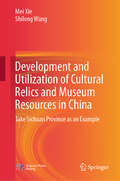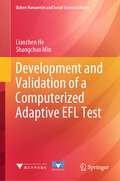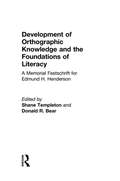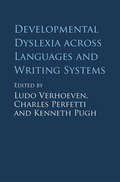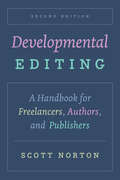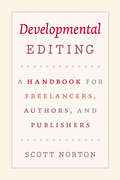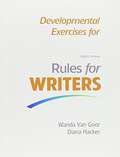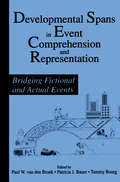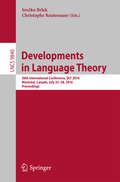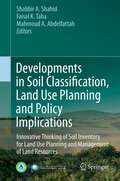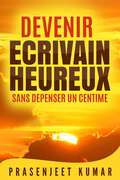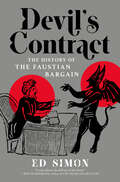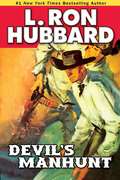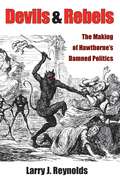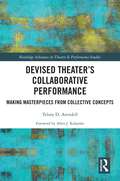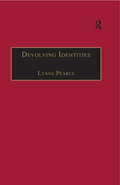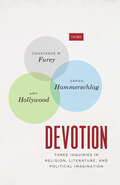- Table View
- List View
Development and Utilization of Cultural Relics and Museum Resources in China: Take Sichuan Province as an Example
by Shilong Wang Mei XieThis book offers fresh critical insights to the field of cultural and museum resources, aiming to explore its transformation and utilization from the cultural value theory. This book for the first time examines the current situation of cultural and museum resources in Sichuan province and proposes that museum cultural creative industries are a new development trend. The content is divided into four sections but interrelated sections to highlight the importance and rationalities of the utilization of cultural and museum resources in Sichuan province. It begins with an exploration of the current situation of cultural and museum resources. This is followed by a section that illustrates the existing issues in the process of its utilization. Lastly, it reveals the influencing factors, experiences, and value of utilization of cultural and museum resources. This book is extremely useful to readers in museums, cultural heritage, and cultural policies studies, cultural industries not just it offers substantive content on museum knowledge, but also because it offers conceptual tools for studying Chinese museum cultural creative industries from a different perspective and re-discusses the relationship between utilization (commercial value) and protection (archaeological value) of museums, and provides some suggestions for policymakers and museum managers.
Development and Validation of a Computerized Adaptive EFL Test (Qizhen Humanities and Social Sciences Library)
by Lianzhen He Shangchao MinThe book reports on the development and validation of a computerized adaptive EFL test, which is used as an exit requirement for non-English-major undergraduates at a major Chinese university. Unlike the tests reported in previous research on computerized adaptive language test (CALT), which were mostly designed to assess vocabulary, grammar and reading, this test consists of listening and reading components using both dichotomously-scored stand-alone items and polytomously-scored testlet-based items. The book is an essential and stimulating read for researchers and graduate students in the testing domain, particularly for those who are interested in CALT, item response theory (IRT), and quantitative research methods in general. It also constitutes a solid reference resource for L2 teachers and test developers. One of the distinctive features of the book is its operationalization of assessment use argument (AUA) in the investigation of the construct validity of the CALT. Another strength of this book is that it provides insight into the specific procedures that are followed in the development of CALTs and addresses a few key issues, such as local item dependence and DIF detection that were ignored in previous CALT development research.
Development of Orthographic Knowledge and the Foundations of Literacy: A Memorial Festschrift for edmund H. Henderson
by Shane Templeton Donald R. BearThis volume unites spelling and word recognition -- two areas that have largely remained theoretically and empirically distinct. Despite considerable advances in the investigation of processes underlying word perception and the acknowledgement of the seminal importance of lexical access in the reading and writing processes, to date the development and functioning of orthographic knowledge across both encoding and decoding contexts has rarely been explored. The book begins to fill this void by offering a coherent and unified articulation of the perceptual, linguistic, and cognitive features that characterize an individual's advancing word/orthographic knowledge, providing evidence for a common knowledge base underlying spelling in writing and word recognition in reading. From a developmental perspective, the studies and syntheses presented in this volume blend insights from psychology and language study with those from clinical and classroom observations. These insights help explain how individuals, from preschool through adolescence, develop knowledge of the orthographic system underlying word structure in English and how they apply this knowledge in actual writing and reading contexts. Implications are drawn for the assessment and teaching of spelling, vocabulary, and word analysis from primary through middle grades.
Developmental Dyslexia across Languages and Writing Systems
by Ludo Verhoeven Charles Perfetti Kenneth PughThis volume presents the first truly systematic, multi-disciplinary, and cross-linguistic study of the language and writing system factors affecting the emergence of dyslexia. Bringing together a team of scholars from a wide variety of disciplines, it takes a dual focus on the language-specific properties of dyslexia and on its core components across languages and orthographies, to challenge theories on the nature, identification and prevalence of dyslexia, and to reveal new insights. Part I highlights the nature, identification and prevalence of dyslexia across multiple languages including English, French, Dutch, Czech and Slovakian, Finnish, Arabic, Hebrew, Japanese and Chinese, while Part II takes a cross-linguistic stance on topics such as the nature of dyslexia, the universals that determine relevant precursor measures, competing hypotheses of brain-based deficits, modelling outcomes, etiologies, and intergenerational gene-environment interactions.
Developmental Editing, Second Edition: A Handbook for Freelancers, Authors, and Publishers (Chicago Guides to Writing, Editing, and Publishing)
by Scott NortonThe only guide dedicated solely to developmental editing, now revised and updated with new exercises and a chapter on fiction. Developmental editing—transforming a manuscript into a book that edifies, inspires, and sells—is a special skill, and Scott Norton is one of the best at it. With more than three decades of experience in the field, Norton offers his expert advice on how to approach the task of diagnosing and fixing structural problems with book manuscripts in consultation with authors and publishers. He illustrates these principles through a series of detailed case studies featuring before-and-after tables of contents, samples of edited text, and other materials to make an otherwise invisible process tangible. This revised edition for the first time includes exercises that allow readers to edit sample materials and compare their work with that of an experienced professional as well as a new chapter on the unique challenges of editing fiction. In addition, it features expanded coverage of freelance business arrangements, self-published authors, e-books, content marketing, and more. Whether you are an aspiring or experienced developmental editor or an author who works alongside one, you will benefit from Norton’s accessible, collaborative, and realistic approach and guidance. This handbook offers the concrete and essential tools it takes to help books to find their voice and their audience.
Developmental Editing: A Handbook for Freelancers, Authors, and Publishers
by Scott NortonEditing is a tricky business. It requires analytical flair and creative panache, the patience of a saint and the vision of a writer. Transforming a manuscript into a book that edifies, inspires, and sells? That's the job of the developmental editor, whose desk is the first stop for many manuscripts on the road to bookdom-- a route ably mapped out in the pages of Developmental Editing. Author Scott Norton has worked with a diverse range of authors, editors, and publishers, and his handbook provides an approach to developmental editing that is logical, collaborative, humorous, and realistic. He starts with the core tasks of shaping the proposal, finding the hook, and building the narrative or argument, and then turns to the hard work of executing the plan and establishing a style. Developmental Editing includes detailed case studies featuring a variety of nonfiction books-- election-year polemic, popular science, memoir, travel guide-- and authors ranging from first-timer to veteran, journalist to scholar. Handy sidebars offer advice on how to become a developmental editor, create effective illustration programs, and adapt sophisticated fiction techniques (such as point of view, suspense, plotting, character, and setting) to nonfiction writing. Norton's book also provides freelance copy editors with a way to earn higher fees while introducing more creativity into their work lives. It gives acquisitions, marketing, and production staff a vocabulary for diagnosing a manuscript's flaws and techniques for transforming it into a bestseller. And perhaps most importantly, Developmental Editing equips authors with the concrete tools they need to reach their audiences.
Developmental Editing: A Handbook for Freelancers, Authors, and Publishers (Chicago Guides To Writing, Editing, And Ser.)
by Scott NortonThe only guide dedicated solely to developmental editing, now revised and updated with new exercises and a chapter on fiction. Developmental editing—transforming a manuscript into a book that edifies, inspires, and sells—is a special skill, and Scott Norton is one of the best at it. With more than three decades of experience in the field, Norton offers his expert advice on how to approach the task of diagnosing and fixing structural problems with book manuscripts in consultation with authors and publishers. He illustrates these principles through a series of detailed case studies featuring before-and-after tables of contents, samples of edited text, and other materials to make an otherwise invisible process tangible. This revised edition for the first time includes exercises that allow readers to edit sample materials and compare their work with that of an experienced professional as well as a new chapter on the unique challenges of editing fiction. In addition, it features expanded coverage of freelance business arrangements, self-published authors, e-books, content marketing, and more. Whether you are an aspiring or experienced developmental editor or an author who works alongside one, you will benefit from Norton’s accessible, collaborative, and realistic approach and guidance. This handbook offers the concrete and essential tools it takes to help books to find their voice and their audience.
Developmental Exercises For Rules For Writers
by Diana Hacker Nancy SommersTo learn any skill--whether snowboarding, tennis, CPR, Web design, or the electric guitar--takes practice. Writing well is no exception: In a college composition class, you will learn to write by writing, and you will learn to revise by revising. Developmental Exercises for Rules for Writers, Eighth Edition, will sharpen your revision skills by giving you a great deal of controlled, yet realistic, practice.
Developmental Spans in Event Comprehension and Representation: Bridging Fictional and Actual Events
by Patricia J. Bauer Paul W. van den Broek Tammy BourgThis book is about building metaphorical bridges--all sorts of bridges. At the most basic level, it concerns the bridges that individuals build to understand the events that they experience--the bridges that connect the events in the mind's eye. At another level, it is about bridges that interconnect findings and theoretical frameworks concerning event comprehension and representation in different age groups, ranging from infancy to adulthood. Finally, it is about building bridges between researchers who share interests, yet may not ordinarily even be aware of each other's work. The success of the book will be measured in terms of the extent to which the contributors have been able to create a picture of the course of development across a wide span in chronological age, and across different types of events, from the fictional to the actual. The individuals whose work is represented in this book conduct their work in a shared environment--they all have an intellectual and scholarly interest in event comprehension and representation. These interests are manifest in the overlapping themes of their work. These include a focus on how people come to temporally integrate individual "snapshots" to form a coherent event that unfolds over time, to understand cause and effect, and to appreciate the role of the goal of events. Another overlapping theme involves the possibility of individual differences. These themes are apparent in work on the early development of representations of specific episodes and autobiographical memories, and comprehension of complex events such as stories involving multiple characters and emotions. The editors of this volume had two missions: * to create a development span by bringing together researchers working from infancy to adulthood, and * to create a bridge between individuals working from within the text comprehension perspective, within the naturalistic perspective, and with laboratory analogues to the naturalistic perspective. Their measure of success will be the extent to which they have been able to create a picture of the course of development across a wide span in chronological age, and across different types of events--from fictional to actual.
Developments in English
by Claudia Claridge Jeremy Smith Irma Taavitsainen Merja Kytö Claudia Claridge Irma Taavitsainen Merja KytöThe history of the English language is a vast and diverse area of research. In this volume, a team of leading historians of English come together to analyse 'real' language, drawing on corpus data to shed new light on long-established issues and debates in the field. Combining synchronic and diachronic analysis, the chapters address the major issues in corpus linguistics – methodological, theoretical and applied – and place special focus on the use of electronic resources in the research of English and the wider field of digital humanities. Topics covered include polemical articles on the optimal use of corpus linguistic methods, macro-level patterns of text and discourse organisation, and micro-features such as interjections and hesitators. Covering Englishes from the past and present, this book is designed specifically for graduate students and researchers working in fields of corpus linguistics, the history of the English language, and historical linguistics.
Developments in Language Theory
by Christophe Reutenauer Srečko BrlekThis book constitutes the proceedings of the 20th International Conference on Developments in Language Theory, DLT 2016, held in Montreal, QC, Canada, in July 2016. The 32 full papers and 4 abstracts of invited papers presented were carefully reviewed and selected from 48 submissions. This volume presents current developments in formal languages and automata, especially from the following topics and areas: combinatorial and algebraic properties of words and languages; grammars, acceptors and transducers for strings, trees, graphs, arrays; algebraic theories for automata and languages; codes; efficient text algorithms; symbolic dynamics; decision problems; relationships to complexity theory and logic; picture description and analysis; polyominoes and bidimentional patterns; cryptography; concurrency; cellular automata; bio-inspried computing; quantum computing.
Developments in Soil Classification, Land Use Planning and Policy Implications
by Shabbir A. Shahid Mahmoud A. Abdelfattah Faisal K. TahaAs the world's population continues to expand, maintaining and indeed increasing agricultural productivity is more important than ever, though it is also more difficult than ever in the face of changing weather patterns that in some cases are leading to aridity and desertification. The absence of scientific soil inventories, especially in arid areas, leads to mistaken decisions about soil use that, in the end, reduce a region's capacity to feed its population, or to guarantee a clean water supply. Greater efficiency in soil use is possible when these resources are properly classified using international standards. Focusing on arid regions, this volume details soil classification from many countries. It is only once this information is properly assimilated by policymakers it becomes a foundation for informed decisions in land use planning for rational and sustainable uses.
Devenir Féministe: un guide masculin pour la défense des droits de la femme et de l’égalité
by Steve ChiabaUn guide du féminisme moderne pour les hommes Avez-vous déjà été victime de violences, de haine, de harcèlement, ou de souffrances du fait de votre genre ? Être féministe ou pratiquer le féminisme implique de se battre pour des problématiques importantes, comme la parité salariale, le respect, les congés de maternité, les droits liés à la procréation, la violence domestique, etc. Si vous voulez en savoir plus sur la lutte pour vos droits et sur la lutte pour les droits des femmes partout dans le monde, alors ce guide est pour vous. - Apprenez à devenir féministe. - Apprenez à vous battre pour vos droits. - Luttez pour l’équité et la parité salariale. - Et bien plus encore ! Apprenez à être du bon côté de l'histoire en aidant l'humanité là où elle a le plus besoin de vous ! --> Retournez en haut de la page et cliquez sur Ajouter au panier pour le commander dès maintenant Avertissement : Cet auteur ou le(s) titulaire(s) des droits ne revendique, ne promet ni ne garantit l’exactitude, l’exhaustivité ou l’adéquation du contenu de ce livre, et décline expressément toute responsabilité pour les erreurs et omissions qui s’y trouveraient. Ce document est diffusé à titre purement informatif. Veuillez consulter un professionnel avant de prendre toute mesure sur le contenu de ce livre.
Devenir écrivain heureux sans dépenser un centime
by Prasenjeet KumarSoyez un auteur plus heureux avant de devenir un auteur à succès L'auteur de la série "Autoédition sans dépenser un centime" présente ce manuel de bricolage contenant des astuces et des conseils pratiques qui peuvent faire de vous un écrivain plus heureux avant de faire de vous un auteur à succès. En s'appuyant sur son expérience pratique et concrète de la publication de plus de 50 livres en sept langues sur toutes les plateformes de livres électroniques, Prasenjeet Kumar s'attaque à toutes les forces qui conspirent pour vous empêcher, vous l'écrivain, de devenir un grand conteur. Le doute de soi, le manque de ventes, les rejets, les "ateliers" excessifs, la dépendance aux ventes et le sentiment que les lecteurs ne s'intéressent pas à vos livres sont quelques-uns des démons qui peuvent rendre les écrivains mécontents, désespérés et découragés. Avec une grande perspicacité personnelle et professionnelle, Prasenjeet Kumar vous explique comment exorciser ces fantômes et vous transformer en un auteur confiant. Alors venez, réalisez vos rêves d'auteur, avec un état d'esprit plus heureux, et, bien sûr, sans dépenser un centime.
Deviant Matter: Ferment, Intoxicants, Jelly, Rot (Sexual Cultures)
by Kyla Wazana TompkinsHow deviant materials figure resistanceYeast ferments, gelatin jiggles, drugs and alcohol froth and bubble, and flesh from animals and plants actively molds and rots. These materials morph through multiple states and phases, and their movement is imbued with a liveliness that is suggestive of volition.Deviant Matter examines four aesthetic and material categories— gelatinousness, fermentation, putrefaction, and intoxication—to theorize how the modern state seeks to manage deviant populations across multiple scales, from the level of the single cell up to the affective and aesthetic imperatives of the state and its bureaucratic projects. Kyla Wazana Tompkins deploys a new materialist engagement with the history of race and queer life, making an argument for queer of color method as political and disciplinary critique. Deviant Matter delves into a vast archive that includes nineteenth-century medical and scientific writing; newspaper comic strips and early film; the Food and Drug Act of 1906; the literature of Martin Delany, Louisa May Alcott and Herman Melville; and twenty-first century queer minoritarian video, installation, and performance art.Drawing from the genealogy of Black feminist and queer of color critique, in Deviant Matter rot, jelly, ferment and intoxicating materials serve as figures for thinking about how matter, art, politics, and affect can be read across multiple scales, ranging from the intimate and molecular everyday to the vast print production and inner workings of the state. Tompkins demonstrates that we are moved by our encounters with the materials in Deviant Matter, producing feelings and sensations that she links to a system of social value where these sensations come to be understood as productive, exciting, disgusting, intoxicating, or even hallucinatory. Moving through multiple states and phase changes, falling apart and reforming again, ferment, rot, intoxicants and jelly energize and choreograph both themselves and human behavior. At the same time, these materialities come to signify exactly those populations whose energy escapes the extractive efforts of capitalism and the state.
Devil In The Drain
by Daniel Pinkwater"For a long time, I knew that the devil lived inside our plumbing. I could hear him making noises, especially down the drain of the kitchen sink. ..."
Devil's Contract: The History of the Faustian Bargain
by Ed SimonA devilishly fascinating tour of the Faustian bargain through the ages, from brimstone to blues and beyond ...From ancient times to the modern world, the idea of the Faustian bargain—the exchange of one's soul in return for untold riches and power—has exerted a magnetic pull upon our collective imaginations.Scholar Ed Simon takes us on a historical tour of the Faustian bargain, from the Bible to blues, and illustrates how the impulse fto sacrifice our principles in exchange for power is present in all kinds of social ills, from colonialism to nuclear warfare, from social media to climate change to AI, and beyond. In doing so, Simon conveys just how much the Faustian bargain shows us about power and evil ... and ourselves.
Devil's Manhunt
by L. Ron HubbardSaddle up with this riveting tale. Young Tim Beckdolt had been working Desperation Peak in Arizona for eight long, treacherous months before striking a rich seam of gold. Now, after three months of hard, grueling labor, he's stockpiled more than $175,000 of gold ore, and his dreams of wealth are about to be realized . . . that is until the loutish Swedish giant Sven and the foppish Virginian killer Bonnet, arrive to jump his claim. Forced by gunpoint to mine the remainder of the gold for this villainous pair, Tim manages to escape into the surrounding wilderness, only to be hunted like an animal through vicious terrain with no weapons to defend himself or food to sustain him. ALSO INCLUDES THE WESTERN STORIES "JOHNNY, THE TOWN TAMER" AND "STRANGER IN TOWN" "With the flair of a Louis L'Amour or Zane Grey." --True West*An International Book Awards Winner
Devils and Rebels: The Making of Hawthorne's Damned Politics
by Larry J. ReynoldsWidely condemned even in his own time, Nathaniel Hawthorne's views on abolitionism and slavery are today frequently characterized by scholars as morally reprehensible. Devils and Rebels explores the historical and biographical record to reveal striking evidence of the author's true political values---values grounded in pacifism and resistant to the kind of binary thinking that could lead to violence and war. With fresh readings of Hawthorne's four major romances and his less familiar works, Devils and Rebels illuminates the difficulties faced by public intellectuals during times of political strife---an issue as relevant today as it was some 150 years ago.
Devised Theater’s Collaborative Performance: Making Masterpieces from Collective Concepts (Routledge Advances in Theatre & Performance Studies)
by Telory D ArendellThis book provides a fascinating and concise history of devised theatre practice. As both a founding member of Philadelphia’s Pig Iron Theater Company and a Professor, Telory Arendell begins this journey with a brief history of Joan Littlewood’s Theatre Workshop and Living Newspapers through Brecht’s Berliner Ensemble and Joe Chaikin’s Open Theatre to the racially inflected commentary of Luis Valdez’s Teatro Campesino and Ariane Mnouchkine’s collaboration with Théâtre de Soleil. This book explores the impact of devised theatre on social practice and analyzes Goat Island’s use of Pina Bausch’s gestural movement, Augusto Boal’s Theatre of the Oppressed in Giving Voice, Anna Deavere Smith’s devised envelope for Verbatim Theatre, The Tectonic Theatre Project’s moment work, Teya Sepinuck’s Theatre of Witness, Pig Iron’s use of Lecoq mime to build complex physical theatre scripts, and The Riot Group’s musical arrangement of collaborative devised text. Included are a foreword by Allen J. Kuharski and three devised plays by Theatre of Witness, Pig Iron, and The Riot Group. Replete with interviews from the initial Pig Iron collaborators on subjects of writing, directing, choreographing, teaching, and developing a pedagogical platform that supports devised theatre.
Devolving Identities: Feminist Readings in Home and Belonging (Studies in European Cultural Transition #8)
by Martin Stannard Greg Walker Lynne PearceThere is no doubt that the political and cultural map of Europe is in the process of being radically redrawn. Alongside the major upheavals in continental Europe, the British Isles has undergone far-reaching constitutional reform. In Devolving Identities, feminist scholars explore their personal negotiations of gender, class, ethnicity and national or regional identity through their readings of two literary and cultural 'texts'. The collection centres on the ontological experience of reading and writing 'as a feminist', and combines the discussion of texts which are inscribed - whether consciously or unconsciously - with the academics' own struggle to reconcile their 'roots' with their current 'situations' or 'identities'. This book's focus on the overlapping of gender and national or regional identity is a direct response to the devolution movements currently active in the British Isles. The contributors are drawn from Scotland, Wales, Cornwall, Ireland, Northern Ireland and selected regions of England. In its complex engagement of subject and text and its political insistence that we no longer consider key aspects of 'identity' in isolation, this volume presents a truly state-of-the-art investigation of (a) what it means to be 'regionally defined' and (b) how the complexity of our positioning in terms of class, gender and nation impacts upon our practice as literary and cultural critics.
Devotion
by Patti SmithFrom the renowned artist and author Patti Smith, an inspired exploration of the nature of creative invention A work of creative brilliance may seem like magic—its source a mystery, its impact unexpectedly stirring. How does an artist accomplish such an achievement, connecting deeply with an audience never met? In this groundbreaking book, one of our culture’s beloved artists offers a detailed account of her own creative process, inspirations, and unexpected connections. Patti Smith first presents an original and beautifully crafted tale of obsession—a young skater who lives for her art, a possessive collector who ruthlessly seeks his prize, a relationship forged of need both craven and exalted. She then takes us on a second journey, exploring the sources of her story. We travel through the South of France to Camus’s house, and visit the garden of the great publisher Gallimard where the ghosts of Mishima, Nabokov, and Genet mingle. Smith tracks down Simone Weil’s grave in a lonely cemetery, hours from London, and winds through the nameless Paris streets of Patrick Modiano’s novels. Whether writing in a café or a train, Smith generously opens her notebooks and lets us glimpse the alchemy of her art and craft in this arresting and original book on writing. The Why I Write series is based on the Windham-Campbell Lectures, delivered annually to commemorate the awarding of the Donald Windham-Sandy M. Campbell Literature Prizes at Yale University.
Devotion: Three Inquiries in Religion, Literature, and Political Imagination (TRIOS)
by Amy Hollywood Sarah Hammerschlag Constance M. FureyThree scholars of religion explore literature and the literary as sites of critical transformation. We are living in a time of radical uncertainty, faced with serious political, ecological, economic, epidemiological, and social problems. Scholars of religion Constance M. Furey, Sarah Hammerschlag, and Amy Hollywood come together in this volume with a shared conviction that what and how we read opens new ways of imagining our political futures and our lives. Each essay in this book suggests different ways to characterize the object of devotion and the stance of the devout subject before it. Furey writes about devotion in terms of vivification, energy, and artifice; Hammerschlag in terms of commentary, mimicry, and fetishism; and Hollywood in terms of anarchy, antinomianism, and atopia. They are interested in literature not as providing models for ethical, political, or religious life, but as creating the site in which the possible—and the impossible—transport the reader, enabling new forms of thought, habits of mind, and ways of life. Ranging from German theologian Martin Luther to French-Jewish philosopher Sarah Kofman to American poet Susan Howe, this volume is not just a reflection on forms of devotion and their critical and creative import but also a powerful enactment of devotion itself.
Devotion: Three Inquiries in Religion, Literature, and Political Imagination (TRIOS)
by Amy Hollywood Sarah Hammerschlag Constance M. FureyThree scholars of religion explore literature and the literary as sites of critical transformation. We are living in a time of radical uncertainty, faced with serious political, ecological, economic, epidemiological, and social problems. Scholars of religion Constance M. Furey, Sarah Hammerschlag, and Amy Hollywood come together in this volume with a shared conviction that what and how we read opens new ways of imagining our political futures and our lives. Each essay in this book suggests different ways to characterize the object of devotion and the stance of the devout subject before it. Furey writes about devotion in terms of vivification, energy, and artifice; Hammerschlag in terms of commentary, mimicry, and fetishism; and Hollywood in terms of anarchy, antinomianism, and atopia. They are interested in literature not as providing models for ethical, political, or religious life, but as creating the site in which the possible—and the impossible—transport the reader, enabling new forms of thought, habits of mind, and ways of life. Ranging from German theologian Martin Luther to French-Jewish philosopher Sarah Kofman to American poet Susan Howe, this volume is not just a reflection on forms of devotion and their critical and creative import but also a powerful enactment of devotion itself.
Devotion: Three Inquiries in Religion, Literature, and Political Imagination (TRIOS)
by Amy Hollywood Sarah Hammerschlag Constance M. FureyThree scholars of religion explore literature and the literary as sites of critical transformation. We are living in a time of radical uncertainty, faced with serious political, ecological, economic, epidemiological, and social problems. Scholars of religion Constance M. Furey, Sarah Hammerschlag, and Amy Hollywood come together in this volume with a shared conviction that what and how we read opens new ways of imagining our political futures and our lives. Each essay in this book suggests different ways to characterize the object of devotion and the stance of the devout subject before it. Furey writes about devotion in terms of vivification, energy, and artifice; Hammerschlag in terms of commentary, mimicry, and fetishism; and Hollywood in terms of anarchy, antinomianism, and atopia. They are interested in literature not as providing models for ethical, political, or religious life, but as creating the site in which the possible—and the impossible—transport the reader, enabling new forms of thought, habits of mind, and ways of life. Ranging from German theologian Martin Luther to French-Jewish philosopher Sarah Kofman to American poet Susan Howe, this volume is not just a reflection on forms of devotion and their critical and creative import but also a powerful enactment of devotion itself.
